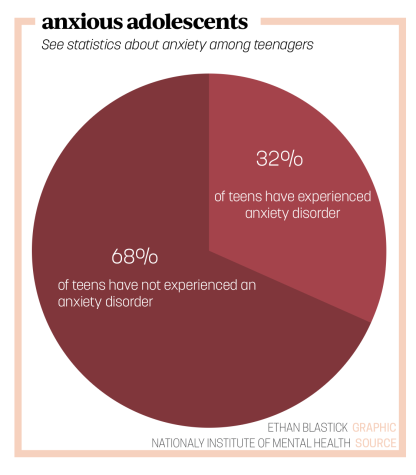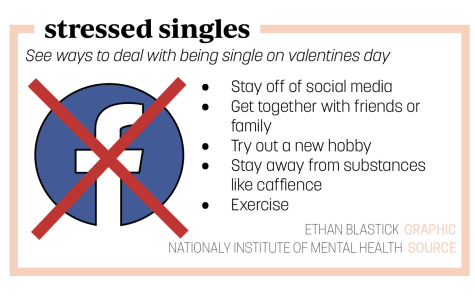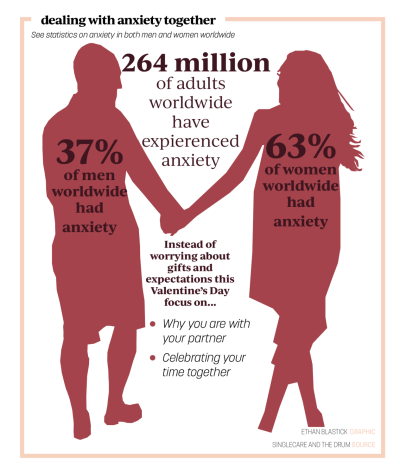Valentine’s Day is an occasion for romance, a day in which we celebrate and remind ourselves of the supreme importance of love. In opposition to what some may think, Valentine’s Day is a bonanza for marketers and a celebration that many people despise. For single people, it emits a spotlight on their isolation. For those in a relationship, it often holds them and their relationship to improper standards.
For Robin Pletcher, AP Psychology teacher, Valentine’s Day is a day to reflect on the things that bring her joy.
“I try to champion that it’s okay to feel things and to self-analyze why that might be the case,” Pletcher said.
But no matter your relationship status, Pletcher says, the most important part of self-care is maintaining and tending to the relationship with yourself.
“The first relationship that we’re in is with ourselves. One thing to do is listen to your inner voice, and if you are someone who is single, maybe have a plan of what you want to do on Valentine’s Day,” she added.
Pletcher plans to reach out to family and friends, and recommends that everyone have some time being social either virtually or even writing a letter, as a way of practicing self-care and celebrating meaningful connections on Valentine’s Day.
“Self-care is not one size fits all…from the brain perspective, self care reinforces the idea of making us happy and productive and plants the seeds to continue. You’re likely to continue watering that seed past Valentine’s Day,” she said.
“There is a giant portion of the population who can’t find a single minute of self-care right now. I want to normalize that it’s okay to not have self-care,” she added.
Senior Adam Bolad thinks that there is more pressure on men than women on Valentines Day.
“As I was growing up I always thought that the man would have to get some sort of present for his significant other. And now that I’m older I feel obligated to get something for my girlfriend,” Bolad said.
New research from YouGov Omnibus shows that there are certain gifts Americans would especially like to receive. It also shows that around 75% of women want something for Valentine’s Day, while only 59% of men want  something.
something.
“There’s many things wrong with the setup of Valentine’s Day. One is that it really reinforces the idea that men are only as good as their purchasing power which is entirely not true. It dumps guys into this role as not just a household provider but as the one who provides these big gifts in order to maintain a woman’s attention. And presumably, if he gets a bad gift, then their partner will give them less attention,” Bolad added.
In agreement with Bolad, junior Patrick Yoon thinks that Valentine’s Day creates a disproportionate amount of emotional stress in men.
“There’s this expectation that a man in a committed relationship with a woman is going to get her a very expensive gift. That is the standard expectation for what you do on Valentines Day. It’s a lot of pressure, because if you don’t do that, it is often interpreted as a sign that maybe you’re not as invested in the relationship as you should be,” Yoon said.
Pletcher wants people to know that what they see marketed online about Valentines Day isn’t necessarily true to what couples may actually experience.
“Firstly, the ads make single people feel stressed if they do not have a partner. Secondly, people who are in relationships may feel they have to make big purchases to prove their love. It is implied that men do not love their partners if they do not meet these expectations,” Pletcher said.
“The mental health impacts can include increased depression and feeling as if they’re not good enough. Additionally, men can experience anxiety as Valentine’s Day approaches. They may worry about buying the perfect gift or their partner’s anger if they do not meet their expectations. I think it is fair to say that the standard for men on Valentine’s Day is unrealistic and unfair,” Pletcher added.

































![AI in films like "The Brutalist" is convenient, but shouldn’t take priority [opinion]](https://hilite.org/wp-content/uploads/2025/02/catherine-cover-1200x471.jpg)









































![Review: “The Immortal Soul Salvage Yard:” A criminally underrated poetry collection [MUSE]](https://hilite.org/wp-content/uploads/2025/03/71cju6TvqmL._AC_UF10001000_QL80_.jpg)
![Review: "Dog Man" is Unapologetically Chaotic [MUSE]](https://hilite.org/wp-content/uploads/2025/03/dogman-1200x700.jpg)
![Review: "Ne Zha 2": The WeChat family reunion I didn’t know I needed [MUSE]](https://hilite.org/wp-content/uploads/2025/03/unnamed-4.png)
![Review in Print: Maripaz Villar brings a delightfully unique style to the world of WEBTOON [MUSE]](https://hilite.org/wp-content/uploads/2023/12/maripazcover-1200x960.jpg)
![Review: “The Sword of Kaigen” is a masterpiece [MUSE]](https://hilite.org/wp-content/uploads/2023/11/Screenshot-2023-11-26-201051.png)
![Review: Gateron Oil Kings, great linear switches, okay price [MUSE]](https://hilite.org/wp-content/uploads/2023/11/Screenshot-2023-11-26-200553.png)
![Review: “A Haunting in Venice” is a significant improvement from other Agatha Christie adaptations [MUSE]](https://hilite.org/wp-content/uploads/2023/11/e7ee2938a6d422669771bce6d8088521.jpg)
![Review: A Thanksgiving story from elementary school, still just as interesting [MUSE]](https://hilite.org/wp-content/uploads/2023/11/Screenshot-2023-11-26-195514-987x1200.png)
![Review: "When I Fly Towards You", cute, uplifting youth drama [MUSE]](https://hilite.org/wp-content/uploads/2023/09/When-I-Fly-Towards-You-Chinese-drama.png)
![Postcards from Muse: Hawaii Travel Diary [MUSE]](https://hilite.org/wp-content/uploads/2023/09/My-project-1-1200x1200.jpg)
![Review: "Ladybug & Cat Noir: The Movie," departure from original show [MUSE]](https://hilite.org/wp-content/uploads/2023/09/Ladybug__Cat_Noir_-_The_Movie_poster.jpg)
![Review in Print: "Hidden Love" is the cute, uplifting drama everyone needs [MUSE]](https://hilite.org/wp-content/uploads/2023/09/hiddenlovecover-e1693597208225-1030x1200.png)
![Review in Print: "Heartstopper" is the heartwarming queer romance we all need [MUSE]](https://hilite.org/wp-content/uploads/2023/08/museheartstoppercover-1200x654.png)



